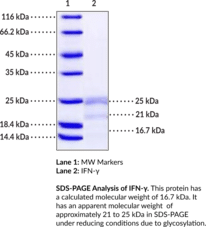Territorial Availability: Available through Bertin Technologies only in France
- Correlated keywords
- IFNγ Th 1 CD 8+ IL12 IL18 IL4 IL10 TGFγ gluco corticoids anti viral bacterial IFNGR
- Product Overview:
Interferon γ (IFN-γ) is a cytokine and type II interferon with roles in innate and adaptive immunity.{23537} It is initially produced by natural killer (NK) and natural killer T (NKT) cells as part of the innate immune response to pathogens, and then by CD4+ T helper (Th1) cells and CD8+ cytotoxic effector T cells as adaptive antigen-specific immunity is developed.{23537,55203} IFN-γ production is induced in response to pathogen-induced secretion of IL-12 and IL-18 by macrophages and is inhibited by IL-4, IL-10, TGF-β, and various glucocorticoids. It facilitates amplification of antigen presentation, the production of reactive oxygen species (ROS), and the induction of antiviral and antibacterial responses by binding to the interferon γ receptor extracellular domain IFNGR1 (Item No. 32006) to induce signal transduction and gene transcription.{23537,52202} In addition to its role in infectious disease, IFN-γ enhances the antigenicity of tumor cells, making them more susceptible to IFN-γ-stimulated immune effector cells.{55205} It induces tumor cell apoptosis and necroptosis, and inhibits tumor angiogenesis in vitro and in vivo. However, IFN-γ-induced removal of highly antigenic tumor cells can leave behind a population with reduced immunogenicity that can evade immune detection and enhance metastasis. Knockdown of Ifng improves insulin resistance in a mouse model of high-fat diet-induced obesity and increases susceptibility to various pathogens in mice.{23537,55204} Cayman’s IFN-γ (human, recombinant) protein can be used for cell-based assay applications. The protein consists of 143 amino acids, has a calculated molecular weight of 16.7 kDa, and a predicted N-terminus of Gln24 after signal peptide cleavage. By SDS-PAGE, under reducing conditions, Cayman’s IFN-γ (human, recombinant) migrates as two bands at 21 and 25 kDa due to apparent differential glycosylation.
Cayman Chemical’s mission is to help make research possible by supplying scientists worldwide with the basic research tools necessary for advancing human and animal health. Our utmost commitment to healthcare researchers is to offer the highest quality products with an affordable pricing policy.
Our scientists are experts in the synthesis, purification, and characterization of biochemicals ranging from small drug-like heterocycles to complex biolipids, fatty acids, and many others. We are also highly skilled in all aspects of assay and antibody development, protein expression, crystallization, and structure determination.
Over the past thirty years, Cayman developed a deep knowledge base in lipid biochemistry, including research involving the arachidonic acid cascade, inositol phosphates, and cannabinoids. This knowledge enabled the production of reagents of exceptional quality for cancer, oxidative injury, epigenetics, neuroscience, inflammation, metabolism, and many additional lines of research.
Our organic and analytical chemists specialize in the rapid development of manufacturing processes and analytical methods to carry out clinical and commercial GMP-API production. Pre-clinical drug discovery efforts are currently underway in the areas of bone restoration and repair, muscular dystrophy, oncology, and inflammation. A separate group of Ph.D.-level scientists are dedicated to offering Hit-to-Lead Discovery and Profiling Services for epigenetic targets. Our knowledgeable chemists can be contracted to perform complete sample analysis for analytes measured by the majority of our assays. We also offer a wide range of analytical services using LC-MS/MS, HPLC, GC, and many other techniques.
Accreditations
ISO/IEC 17025:2005
ISO Guide 34:2009
Cayman is a leader in the field of emerging drugs of abuse, providing high-purity Schedule I-V Controlled Substances to federally-licensed laboratories and qualified academic research institutions for forensic analyses. We are certified by ACLASS Accreditation Services with dual accreditation to ISO/IEC 17025:2005 and ISO Guide 34:2009.





